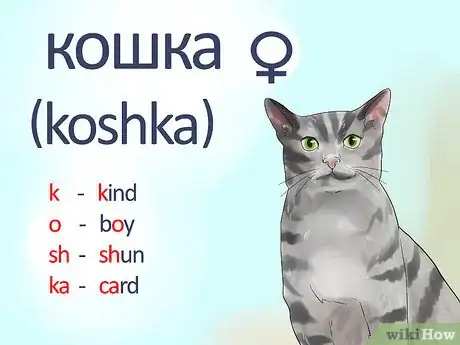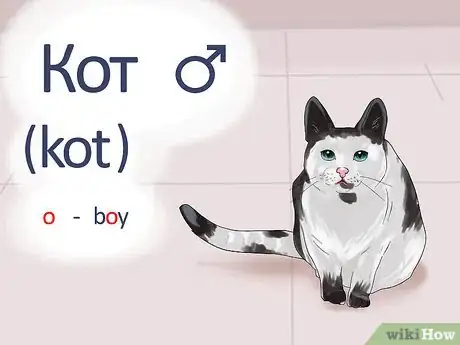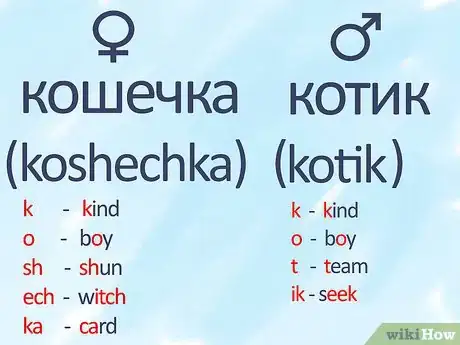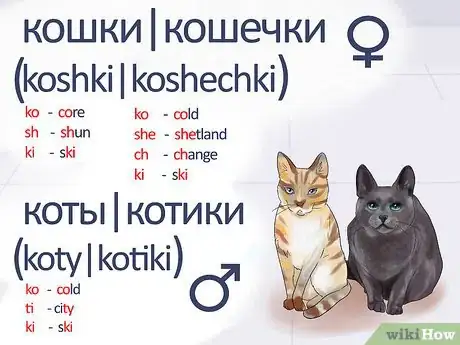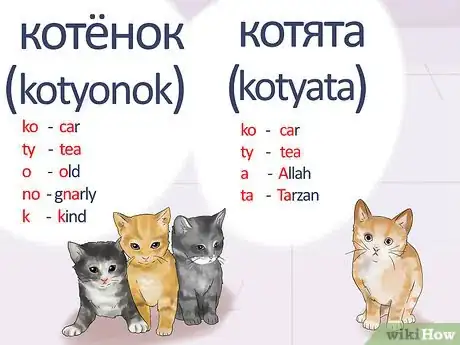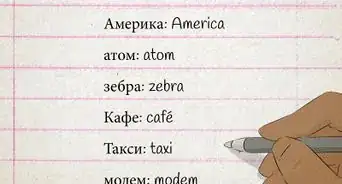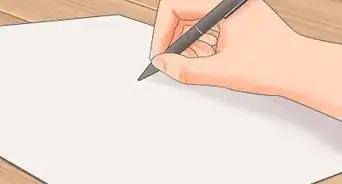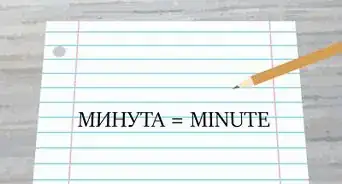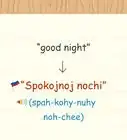X
wikiHow is a “wiki,” similar to Wikipedia, which means that many of our articles are co-written by multiple authors. To create this article, 17 people, some anonymous, worked to edit and improve it over time.
This article has been viewed 166,619 times.
Learn more...
Russian does not contain a proper word for gender-neutral English word 'cat'; one can only say 'she-cat' or 'he-cat' for adult cats. However there is a gender-neutral word for kittens. All of these different words for 'cat' may confuse you.[1] If you want to say the word 'cat' properly in Russian, see Step 1 to learn how.
Steps
-
1If you are talking about a single she-cat, say 'koshka' (кошка).You pronounce the 'k' as in 'kind', 'o' as in 'boy', 'sh' as in 'shun', and 'ka' as in 'card'.[2]
-
2If you are talking about a single he-cat, say 'kot'. It is the same as English 'cat' but with 'o' instead of 'a'. This 'o' sounds like the o in 'boy'.[3]Advertisement
-
3If you would like to call the cat using diminutive form (like Jake for Jakeson or Liz/Lisa/Beth for Elizabeth), you can use 'koshechka' (кошечка) for female and 'kotik' (котик) for male.[4]
- For 'koshechka', you pronounce it like 'k' as in 'kind', 'o' as in 'boy', 'sh' as in 'shun', 'ech' as in 'witch', and 'ka' and 'card'.
- For 'kotik', you pronounce the 'k' as in 'kind', 'o' as in 'boy', 't' as in 'team', and 'ik' as in 'seek'.
-
4If you are talking about more than one cat, you must use the plural form of the word. She-cats would become 'koshki' (кошки) ; he-cats - 'koty' (коты); diminutive form of these would be respectively 'koshechki' (кошечки) and 'kotiki' (котики).[5]
- For 'koshki', you pronounce it like 'ko' as in 'core', 'sh' as in 'shun', and 'ki' as in 'ski'.
- For 'koty', you pronounce the 'ko' as in 'car', and 'ty' as 'timber'. For 'koshechki', you pronounce the 'ko' as in 'cold', 'she' as in 'Shetland', 'ch' as in 'change', and 'ki' as in 'ski'. For 'kotiki', you pronounce the 'ko' as in 'cold', 'ti' as in 'city', and 'ki' as in 'ski'.
-
5If you are talking about a kitten or kittens, use 'kotyonok' (котёнок) to say kitten and 'kotyata' (котята) to say kittens. These words are already diminutive and don't have non-diminutive form.[6]
- To pronounce 'kotyonok', say the 'ko' as in 'car', 'ty' as in 'tea' (try to say the 't' softly), 'o' as in 'old', 'no' as in 'gnarly', and 'k' as in 'kind'.
- For 'kotyata', pronounce the 'ko' as in 'car', 'ty' as in 'tea' (once again try to say the 't' softly), 'a' as in 'Allah', and 'ta' as in 'Tarzan'.
Advertisement
Community Q&A
-
QuestionWhat if I don't know if the cat is male or female?
 Community Answerif you are not sure, you cat refer to it as either male or female, it doesn't make much of a difference.
Community Answerif you are not sure, you cat refer to it as either male or female, it doesn't make much of a difference. -
QuestionSeems like Google translate is pretty messed up, because (almost) nothing said in this can be translated. Koshka becomes just cat, kot doesn't work, kotyata becomes kittens; why?
 Community AnswerKoshka is the general translation for cat, but it can also mean female cat. Kot is male cat. Kotyata is kittens, and kotyonok is kitten.
Community AnswerKoshka is the general translation for cat, but it can also mean female cat. Kot is male cat. Kotyata is kittens, and kotyonok is kitten. -
QuestionHow would I say "a brown cat with grey ears"?
 Community AnswerA brown cat with grey ears would be "коричневый кот с серыми ушами" (korychneviy kot c cerymy ooshamy).
Community AnswerA brown cat with grey ears would be "коричневый кот с серыми ушами" (korychneviy kot c cerymy ooshamy).
Advertisement
References
- ↑ https://news.itmo.ru/en/news/9489/
- ↑ https://en.openrussian.org/ru/%D0%BA%D0%BE%D1%88%D0%BA%D0%B0
- ↑ https://en.openrussian.org/ru/%D0%BA%D0%BE%D1%82
- ↑ https://en.bab.la/dictionary/russian-english/%D0%BA%D0%BE%D1%88%D0%B5%D1%87%D0%BA%D0%B0
- ↑ https://www.russiandict.net/translate/cat
- ↑ https://en.bab.la/dictionary/russian-english/%D0%BA%D0%BE%D1%82%D0%B5%D0%BD%D0%BE%D0%BA
About This Article
Advertisement
